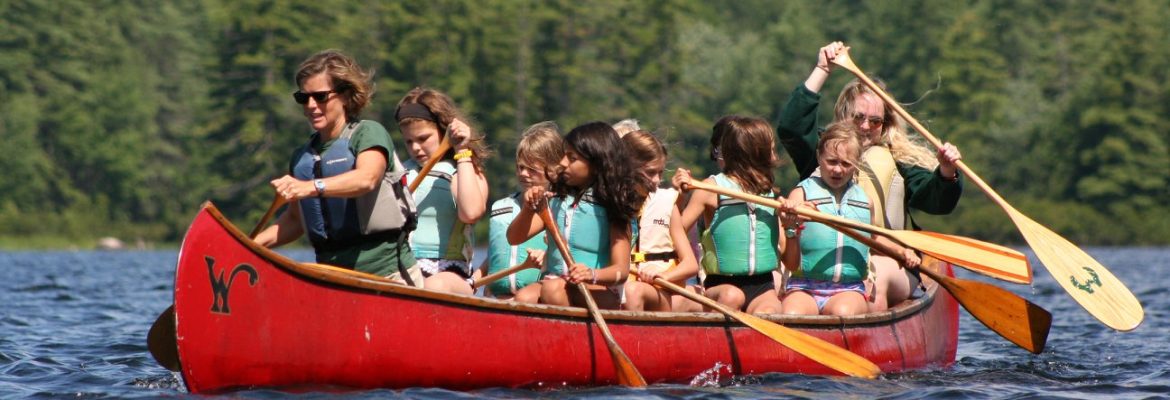by zach clayton • mpa board member
Moose Pond has always been a popular place for locals and tourists alike. In any season, the lake and its surrounding mountains offer a wide range of activities that are enjoyed by all ages. The lake’s popularity has increased in recent years as more homes have popped up along the shoreline and as working-from-home has become a more prevalent way of life. Most residents and visitors are likely familiar with the three basins, the boat ramps, and, of course, Pleasant Mountain, but some of you may be less familiar with the Sleep-Away Summer Camps that have called Moose Pond home for more than 100 years.
While legend has it there were once up to four camps on the lake (two on the south basin and two on the main basin), only two camps remain: Camp Wyonegonic, a girls’ sleep-away summer camp founded in 1902, and Camp Winona, a boys’ sleep-away camp founded in 1908. Both camps were founded by the Cobb Family, who were educators and instilled the camps with a love of learning and a deep respect for the outdoors. This philosophy has been carried through the generations. Campers take part in a wide array of activities from team sports, to archery, swimming, and sailing, as well as frequent field trips to the surrounding mountains, rivers, and lakes. Both camps’ current owners, the Sudduth family (Wyonegonic) and the Ordway family (Winona) strive to preserve the Cobb Family’s philosophy.
While these two camps are each unique in their own right, they do share many similarly special qualities. One such quality is the amazing waterfront that has played such a major role in the camp’s history and present activities. Before roads wound their way through the countryside of Bridgton and Denmark, staff, campers, mail, and supplies all came to the camps by boat on the waters of Moose Pond. Both camps still refer to the old dock numbers that served as a type of “address.” These days, the camps boast campers from all over the world who escape to “the shores,” as they call Moose Pond, every summer.
Much of the staff are former campers who plan to send their own children, should they have them, to camp someday. Their thoughts about Moose Pond are intertwined with their feelings about their camp experience, and as Clayton Miles (a former camper, parent, and long-time staff member at Camp Winona) described to me, “They wake up to it [the lake], they fall asleep to it, they play in it, and it is the backdrop to some of the most important moments of their young lives.” As we continued to talk about the idea of stewardship, we both agreed that building a love of place creates generations of stewards for the camps and lake on which they sit. The camps also provide an introduction to the outdoors and the qualities of nature that make it such a magical part of life itself.
Building a love of place creates
generations of stewards for
the camps and lake on which they sit.
Sara Fields Polstein, a former camper, counselor, and now parent to a future camper, reflected on her own camp experience saying, “Wyo was my first and really only exposure to the outdoors – it’s where I gained a love and appreciation of nature.” This reflection rings true for many campers, especially in this digital world. Sara continued: “Preserving the oasis of Moose Pond so that my son can experience camp is incredibly important to me.” The summer camp communities, both past and present, represent a group of people who care deeply about the health of Moose Pond. The lake and the camps are inextricably connected, and the health of one impacts the other.
The next time you’re on the lake and see a group of campers paddling in canoes or enjoying the water from the dock, or maybe you bump into them hiking on Pleasant Mountain, remember they are part of the next generation of people who hope to protect this truly special place.
Importantly, each camp intentionally educates their own communities about the original inhabitants of the area. The summer camps have been situated on Moose Pond’s shoreline for over the last 100 plus years, but the lake and surrounding wilderness were part of the traditional hunting grounds and inhabited for thousands of years by the Pequawket tribe prior to European colonization and expansion. Both camps conduct land acknowledgments and honor the historical significance of this native American heritage to the Moose Pond Basin region.
For more information about Wyonegonic or Winona and their unique histories, please visit their websites. If you are interested in seeing some truly spectacular photos of the lake and its surroundings, check out Clayton Miles’ photography at www.cjmilesphoto.com.
To learn more about how you can help protect Moose Pond, please visit the MPA website at
www.moosepondassociation.org.

